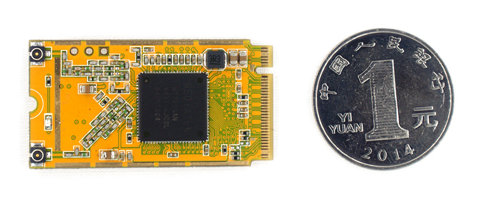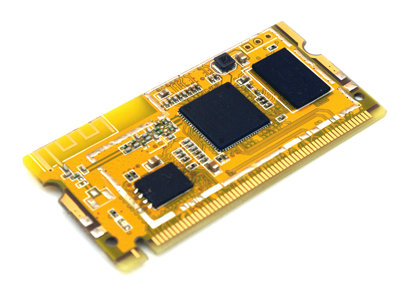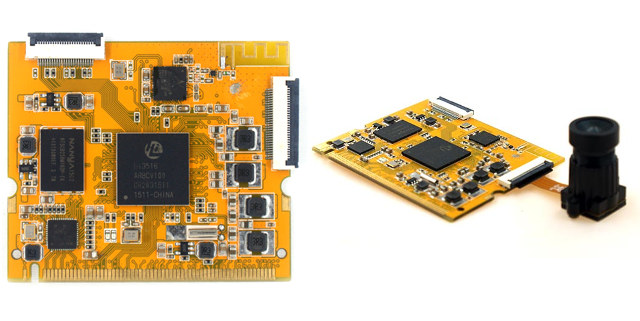WRTnode is a small and low cost development board powered by Mediatek MT7620N and running OpenWRT. The developers have been working on three new OpenWRT boards based on Mediatek or Hisilicon processor and featuring either an M.2 connector, a mini PCIe connector, or support for H.265 camera.

The first board is WRTnode2P with the following specifications:
- SoC – Mediatek MT7628an MIPS 24KEc processor @ 575 MHz
- System Memory – 256 MB RAM
- Storage – 32MB Flash
- Connectivity – 802.11 b/g/n WiFi @ 300 Mbps (2T2R)
- I/Os via NGFF M.2 connector:
- PCIe X1, USB 2.0 host, SD-XC
- 5x 100M Ethernet switch
- I2S up to 192K/24-bit
- 2x UART, SPI, I2C
- 20x GPIO
- Dimensions – 42 x 22mm

The second board, WRTNode2R, features a processor and a micro-controller, and can be connected to a mini PCIe port:
- SoC – Mediatek MT7688an MIPS24K Processor @ 580 MHz
- System Memory – 256 MB DDR2
- Storage – 32MB NOR Flash
- MCU – STMicro STM32F103 Cortex M3 micro-controller
- Connectivity – 802.11 b/g/n WiFi @ 300 Mbps (2T2R)
- I/Os via mPCIe connector (preliminary, exact details are TBC):
- Mediatek processor
- PCIe X1, USB 2.0 host, SD-XC
- 5x 100M Ethernet
- I2S up to 192K/24-bit
- 2x UART, SPI, I2C
- 4x PWM
- 20x GPIO
- STM32 MCU:
- 5x 12 A/D
- 26x GPIO
- 10x PWM @ 36 MHz
- CAN, 3x timer
- Mediatek processor
- Dimensions – N/A
The Mediatek processor runs OpenWRT, while the ST Micro MCU will run Liteos, but not LiteOS “open source, UNIX-like operating system designed for wireless sensor networks”, but rather Liteos developed by Huawei, which can also run on OpenWRT. More information about Liteos can be found on the community page. (Chinese only).

The third and last board, WRTnode Hi, is a little different because it’s a WiFi camera board powered by Hisilicon Hi3516A:
- SoC- HiSilicon Hi3516A ARM Cortex A7 processor @ 600MHz with NEON and FPU
- System Memory – 512B DDR3
- Storage – 32MB SPI Flash
- Connectivity – 802.11 b/g/n WiFi
- Camera Support
- Up to 5MP sensor
- H.264 / H.265 multi-stream real-time encoding
- H.265 up to 2560×1920 @ 30 fps at 4 Mbps
- I/Os via mPCIe edge connector
- 2x SAR-ADC
- 4x UART interfaces
- IR, I2C, SPI master, I2, GPIO
- 8x PWM interface (four independent, four multiplexed with other pins)
- 2x SDIO 3.0 interface with support for SDXC
- 1x USB 2.0 HOST / Device interface
- 100/1000Mbps Ethernet
- Dimensions – N/A
The board also runs OpenWRT, and an SDK will be provided to handle the camera.
Both three boards appears to target the Chinese market, at least for now, as most information is only in Chinese, including product pages for WRTnode2 boards and WRTNode Hi board. Retail pricing has not been announced, but I understand that 50 pieces of WRTNode2R are currently offered for 148 RMB ($23) to beta testers in China, who can apply via Elecfans forums. If I have not lost too much in translation, these beta boards will ship at the end of September.
Thanks to Freire for the tip.

Jean-Luc started CNX Software in 2010 as a part-time endeavor, before quitting his job as a software engineering manager, and starting to write daily news, and reviews full time later in 2011.
Support CNX Software! Donate via cryptocurrencies, become a Patron on Patreon, or purchase goods on Amazon or Aliexpress




